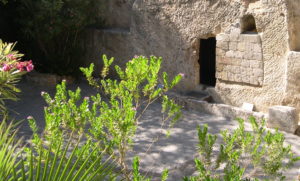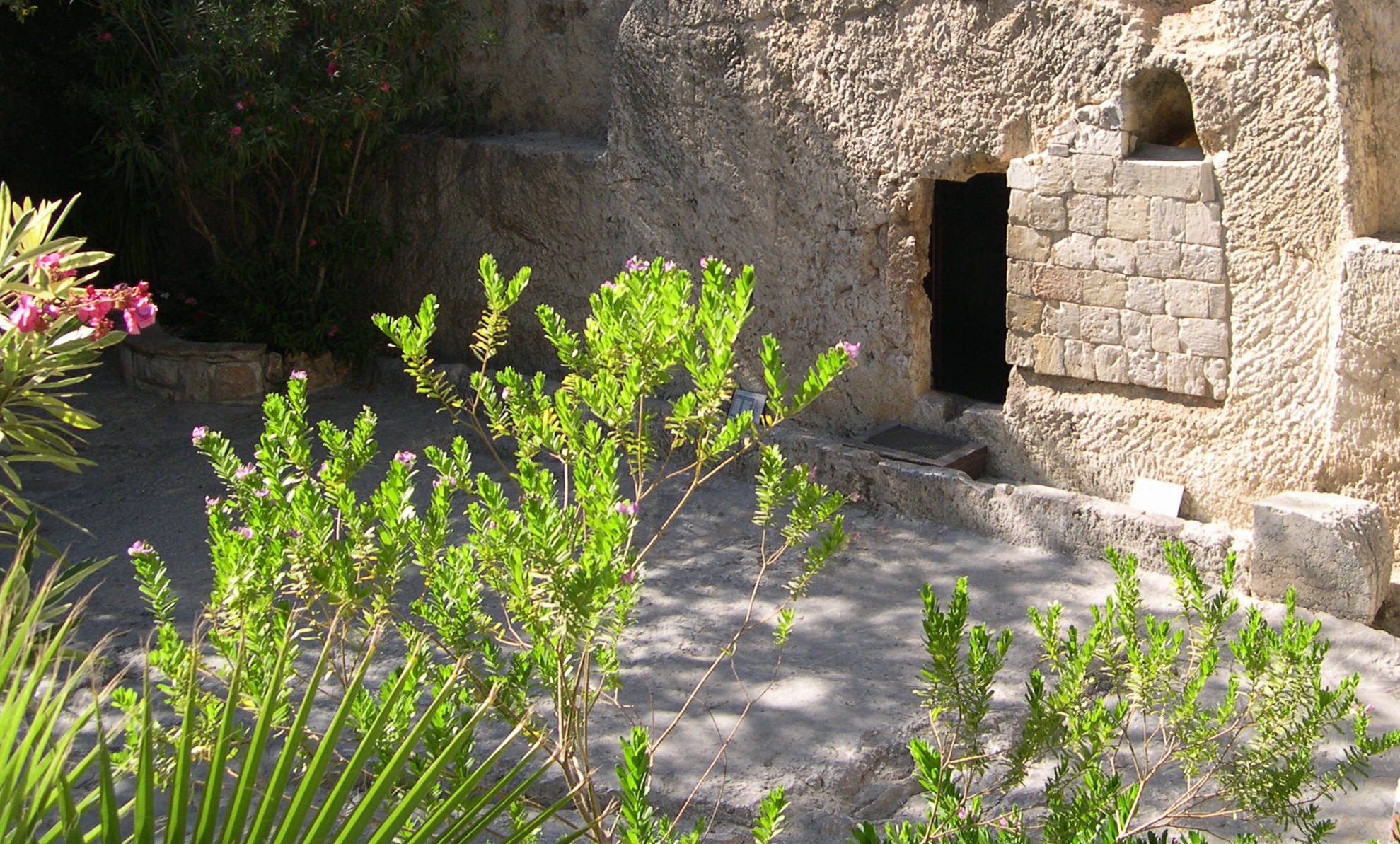
I wasn’t afraid to tell the truth. It was the biggest day of my life, the biggest day of anyone’s life when you think of it. In fact, the biggest day in the history of the whole world. And I was there.
On that very first Easter morning, I was there. I was the gardener.
The Romans and the Jewish high priests knew it too, so of course they interrogated me, wanting to know what I saw that morning. They all figured I knew something, that I’d seen something. And they were right. I had a better vantage point than anybody.
Our boss told us to be on the job early Sunday morning, the first day of the week. There was a terrible storm the previous Thursday and the city was a mess. People said it was an earthquake. Trees were down everywhere in Jerusalem. It was our job to clean up the city and get it ready for the next big city-wide event, the Feast of Pentecost.
My area was the garden tomb, not far from where they executed the man they called Jesus of Nazareth on the day of the earthquake. Sunday morning, I showed up early, just after daybreak. As I rounded that last curve along the dirt path that I’d taken so many times before, I noticed the stone that covered the tomb was rolled back. Odd, I thought. I heard voices coming from inside the tomb so I hid behind some brush and listened. A woman stooped before the dark opening, crying as if in terrible anguish. As first light peered over the horizon, I could see her reddened face, her eyes begging for a tiny sliver of hope from the voices inside.
“They have taken away my Lord”, she said. “And I do not know where they have laid him.”
I never saw him approach, but suddenly there appeared a man behind her. She turned, not looking directly at him, her face to the ground still, and spoke. He answered, calling her by name. Mary. Raising her eyes, she recognized him. I could see his face too. He looked faintly familiar, just enough to stir in me a vague, and for some reason painful remembrance. In the woman, he stirred only joy and relief. Elated, she impulsively threw her arms around his legs. He admonished her gently, raised her to her feet, gave her a message to deliver and sent her off.
Petrified, not a sound did I make. Yet turning slightly, he looked through the tightly wound branches behind which I hid, as if he knew all along. Our eyes met and in an instant I remembered where I’d seen him. I wanted to turn away in shame. But his gaze was gentle, comforting, without a hint of judgment. He didn’t utter a word, yet I knew I’d been forgiven. Immediately, undeservedly, irreversibly forgiven.
I first encountered the Nazarene on the day of the storm.
Jesus was his name. It was morning. I heard a great commotion and saw the mob parading him through the streets. At the council of the high priest, he had already been beaten and was being hauled away in chains. I’d heard much about this Jesus, all Jerusalem had. Out of curiosity, I followed the crowd.
Along the way to Pilate’s palace the people taunted him with insults and hurled things. He did nothing to protect himself. He bore every punishing blow, each sarcastic slur as if it was his lot to bear. When we arrived at the praetorium, the Roman cohort took the Nazarene before Pilate, the governor. But Jesus’s silence only infuriated the crowd, which grew louder, and Pilate was powerless to stop it. Soon, as if possessed by demons, the angry mob began to chant, which grew to an ear-piercing, cacophonous uproar.
Crucify him!
Seconds passed, then I heard someone new join the wretched chorus. Someone I’d never expect, the voice of a man I thought I knew, yet now seemed to me a total stranger. He cried out even more loudly than the others, “Crucify him! Crucify him! Crucify him!” The voice was my own.
At that moment, Jesus raised his eyes to meet mine. In an instant, I could speak no more. I ran from the crowd, desperate to get away. I found a vacant alley, and wept. He was innocent, but that didn’t matter. We had shackled him with our own guilt. The chains he wore had been forged link-by-link, by our sin. His innocence was like a mirror reflecting back to us our own moral failings. He held up our souls, as though against the sun, exposing the stain that all but blotted it out. He stood accused, but we were the guilty ones.
For three days and nights, I wrestled with God. Guilt. Shame. Sin. Innocence. How can they be reconciled? What are his expectations? It wasn’t till he recognized me in the garden with a look that cut to the marrow, that it all came together. He didn’t come to judge me, but to save me. The law our fathers handed down was given to expose within ourselves our own destitute condition, our need for a sufficient, satisfying, act of atonement. There was only one permanent solution, one perfect sacrifice:
The very Lamb of God.
This Jesus the perfect Lamb, this Christ unjustly crucified, died and rose again on my behalf, that I might live. And when he rose that first Easter morning, I rose with him. My sin entombed, “my heart set free, I rose, went forth and followed thee.” This amazing love now separates from me my sin as far as the east is from the west. And the life I now live I live by faith in the Son of God. Mary understood. That’s why she embraced him. Allow me to embrace you Jesus, hold me close, be my only Lord and God. Make of me a good and faithful servant.
This day remind me that I am forgiven because you have risen. Lord, you have risen.
You have risen indeed.
The Gardener.
© Ben LaCorte, WordTrax

